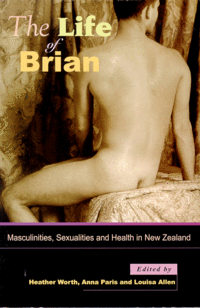

![]()
![]()

Given that the growth of academic interest in masculinities is a worldwide phenomenon, perhaps the most interesting aspect of this collection is the extent to which it brings together the specificities of New Zealand society and the intellectual concerns of those sociologists working elsewhere on the globe. Its greatest strength lies in the enthusiasm with which its authors explore the particular New Zealandness of masculinities 'down under'. The increasing ethnic diversity of this small south Pacific nation comes through strongly. The chapters consider Pakeha men's conceptions of health and sexuality alongside Samoan masculinities, Maori gay men's understandings of cultural and sexual identity, and gender liminality within the lives of young Maori and Pacific Islanders. Richard Pringle's intimate Foucauldian analysis of his own identity in relation to rugby explores the iconic status of this sport in New Zealand, and its significance for male identities in this nation.
Particularly notable is the authors' determination to take seriously the insight that masculinities involve interconnections between gender, sexuality and ethnicity. Not content to simply assert that these facets of identity are connected, the authors conduct detailed, nuanced analyses of these connections. For example, Julie Park et al examine the interlacing of gender, kinship and economic provision in the construction of Samoan masculinities, while Terry O'Neill explores 'multiply- differentiated' masculinities through his work with disabled gay men. The lives of the men featured here clearly involve ambiguity and contradiction as well as coherence and continuity. In their determination to interrogate these multiplicities, these chapters move beyond those earlier writings that have problematised the coherence of gender as a concept by invoking ethnicity without actually exploring the implications of one for the other.
While the chapters in this collection offer a strong contribution to the exploration of multiplicity and specificity, in other respects their engagement with the international literature is weaker than it ought to be. The reader is alerted to this by the editors' introductory claim that 'a quick look through the available academic literature on this topic reveals a thin veil of academic interest in theorising the subject' (p.11). While this sort of claim is a popular opening gambit, it appears hard to sustain in this case. Academic work on men is rather thin on the ground in New Zealand, but outside of this country the presses are churning out a substantial volume of writing on masculinity, sexuality and identity. Some of this is sociological, some is produced within other disciplines, and more detailed searching would have turned it up.
Clive Aspin offers a timely discussion of gay and takatapui identity among Maori men that would have been even stronger had it engaged with the burgeoning interdisciplinary literature on sexuality, desire and the cultural construction of identity categories. Louisa Allen's piece on young men's experiences of (hetero)sexual pleasure uses concepts of embodiment innovatively, but could have taken up more of the international work on young men's sexuality. This would have enhanced her discussion of the role of power in constituting male sexuality. Throughout the collection the use of R.W. Connell's concept of 'hegemonic masculinity' is patchy, with some authors implying it denotes stability or fixity rather than contestation and movement. This is somewhat odd given that Connell introduces this concept in his opening chapter in this very collection, and is quite clear in his other writings that hegemonic masculinity is a historically-shifting state of play (e.g. Connell, 1987: 184).
This is a tantalising collection. Its strengths as well as its weaknesses point to the importance of studying masculinities in ways that mediate 'local' contexts and international concerns. In moving forward it will be important to attend to the specificities and complexities of particular geographical and cultural contexts, while reflecting and further developing the insights gained over a wider, more 'global' sociology.
Chris Brickell
University of Otago, New Zealand